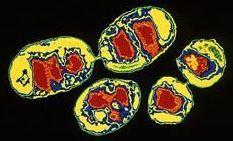Circa 2010
Researchers have discovered a possible new species of bacteria that survives by producing and ‘breathing’ its own oxygen. The finding suggests that some microbes could have thrived without oxygen-producing plants on the early Earth — and on other planets — by using their own oxygen to garner energy from methane (CH4).
“The mechanism we have now discovered shows that, long ago, these organisms could have exploited the methane sources on Earth and possibly on other planets and moons by mechanisms that we didn’t know existed,” says Mike Jetten, a microbiologist at Radboud University Nijmegen in the Netherlands and part of the team that conducted the study, which is published in Nature today1.
The oxygen-producing bacterium, provisionally named Methylomirabilis oxyfera, grows in a layer of methane-rich but oxygen-poor mud at the bottom of rivers and lakes. The microbes live on a diet of methane and nitrogen oxides, such as nitrite and nitrate. These nitrogen-containing compounds are especially abundant in sediment contaminated by agricultural runoff.
